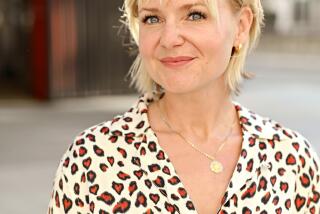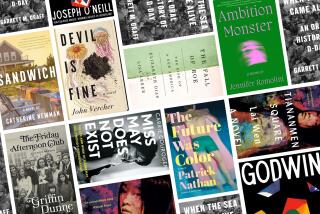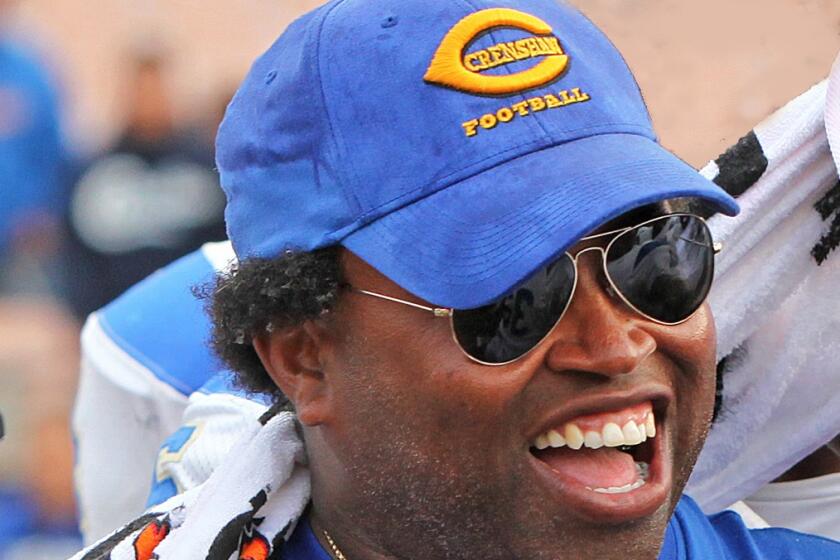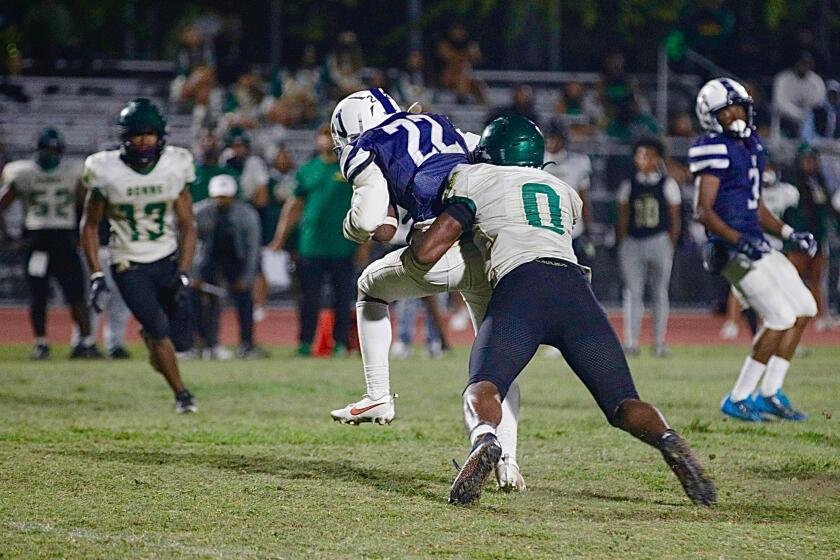Frat Rats, Fat Cats : GOAT BROTHERS, <i> By Larry Colton (Doubleday: $23.95; 560 pp</i> .<i> , illustrated)</i>
In the early â60s nothing was too large or too small to waste, not talent, youth, pride or your parentsâ money.
Such was the case for the well-heeled new pledges, or âGoat Brothers,â of the Pi Kappa Alpha fraternity at the University of California, Berkeley. Their lives were filled with reward and devoid of the expectation of work commitment and sacrifice.
Take Loren Hawley, the selfish user of the group. He expects to play pro football but canât believe the Raiders actually want him to come to training camp. He shows them--not only heading for Europe but taking Miss California with him--and they respond by inviting him again the following year.
Ultimately they learn, however, and cut him, leaving Loren to embark upon a career of money mismanagement. Itâs mostly the money of others--he isnât a total dummy. His grandparents swallow $35,000 ventured with him while heâs giving free sports equipment to coeds, and his buddy Craig Morton is forced to declare bankruptcy thanks to Lorenâs schemes. Heâs also smart about responsibility: He doesnât take any, preferring to sue a former partner for an out-of-court settlement. That so much could be learned at so young an age is testament to our educational system.
Thereâs Steve Radich, amusingly nicknamed âWrong Way Radichâ after the drunken night he sailed into oncoming traffic and almost killed some lesser people. Frank Radich, his father, is a Yugoslavian immigrant who worked like a dog to turn a vegetable cart into a thriving grocery so he could pay for his sonâs college education. His son is the one who leaves his girlfriend with a fractured tibia on an expert slope. Why ruin a good day of skiing? (By the way, she was peeved about it later.)
Ron Vaughn, who actually does study (and hard) to become an architect, abandons his newborn son at a local hospital, claiming he found him outside. The boy is better off, believe me, because Vaughn does it again with another woman and their child. Oh, he stumbles through the â70s unable to work or concentrate, in and out of institutions, consumed as he is by guilt. Vaughnâs guilt (which places him a rat hair higher on the evolutionary plane than his frat brothers), also stems from his cowardice; a light-skinned black, heâs passing for white. He finds the assassinations of Martin Luther King and Malcolm X and the burnings of Watts and Newark upsetting, but he has more anxiety over a big date with a hot coed.
Then thereâs the author himself, Larry Colton. Colton seems like a nice guy, nice but bewildered, both then and now. Then because he couldnât see how long were the odds in establishing himself as a major-league-baseball pitcher and so never bothered with classes or study; now because heâs still unaware how loathsome he and his friends were when it came to women. He does get some degree of comeuppance, though, when his second wife turns feminist and refuses to shave her legs.
That the women in this book are barely characterized should come as no surprise; after all, they live to serve, and as serving trays they function well. Thereâs Donna, Linda, Anna, Patty, Mary (Did any of them ever get last names? I canât remember) and a host of others. Colton opens his little black book for a quick physical introduction of each and thatâs about it. I do remember that the girl who finally helped him out of his virginity (and I canât repeat here the nickname his frat-house chums have for members of her sorority) had thin legs, thick glasses and large breasts, and wore her brown hair in a flip. I donât know if Colton realizes how this characterization reflects more upon himself than the hapless girl.
Itâs an idyllic male past, one in which women are desirable as long as they remember their proper roles as things--things to gain, things to serve. Much has happened since, including one Anita Hill getting sawed off at the legs by a bunch of guys in an exclusive Washington fraternity, but Colton shows no signs of having kept up with the times. In early middle age, heâs still playing âmanly manâ in a drinking bout with a buddy, getting into âserious male bondingâ while rhapsodizing about wanting all the women in the world. Yawn.
The lone exception to his sad roster is Jim van Hoften, a dedicated but athletic bookworm who studies engineering fiercely and winds up a jet pilot, astronaut and partner in Bechtel. Nobody at the fraternity remembers why such an obvious geek was pledged; in retrospect, of course, it was fabulous luck. But Van Hoftenâs story is the telling one in the book: Those who never fit in and had to struggle to succeed did just that--succeed. The ones who got everything easy got nowhere. That any of them but Van Hoften even got a degree is a disgrace not only to the university but to the rest of us who like to think we earned ours.
Unfortunately, Colton draws no such lessons for us. In fact, he draws no lessons at all; he is the Candide of today, wondering whatever happened to that best of all possible worlds. His narrative carries all the drama of a bake-off (the turmoil of the â60s never sounded so routine, and neither did sex), and the three top jocks are for the first third of the book indistinguishable; theyâre Siamese triplets joined at the personality.
After a few hundred pages, Loren comes across as the biggest jerk, somebody who beats up peace protesters for the heck of it and gets his grandparents to pay for his girlfriendâs abortion. On the other hand, Steveâs the guy who goes steady with Ayris while heâs married to Linda, with whom he has a son. But whoâs comparing?
Ugly people can be fun in print, no doubt about it--witness Charles Bukowskiâs gallery of bums and mugs. But Bukowski is smarter than Colton; he knows the game and heâs always on the outside of it, our side. And heâs honest. But when the author is actively rooting for the ugly (indeed, when the ugly are his friends and he doesnât even feel embarrassed for them); when at age 50 heâs still too naive even to see how ugly they are, then weâre in trouble.
We all have friends who make us uncomfortable. Either weâre not sure what it is about them that attracts us, or we are sure and weâd rather not have to apologize for it. But at the very least, most of us are smart enough not to go around bragging about them and acting as though, God forbid, theyâre representative of their generation.
Some lives are better left unexamined.
More to Read
Go beyond the scoreboard
Get the latest on L.A.'s teams in the daily Sports Report newsletter.
You may occasionally receive promotional content from the Los Angeles Times.










